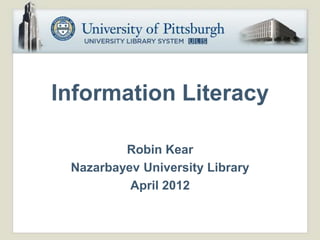
Robin kear information literacy
- 1. Information Literacy Robin Kear Nazarbayev University Library April 2012
- 2. What is Information Literacy? Set of abilities requiring individuals to “recognize when information is needed and have the ability to locate, evaluate, and use effectively the needed information.” ACRL Information Literacy Competency Standards for Higher Education http://www.ala.org/acrl/standards/informationliteracycompetency
- 3. ACRL Standards Created in 2000 and modified by the American College & Research Libraries division of the American Library Association http://www.ala.org/acrl/sites/ala.org.acrl/files/content/standards/standards.pdf
- 4. Standards Toolkit The Standards Toolkit is a set • Standard One: Know of tools, web pages and other • Standard Two: Access resources that will help you • Standard Three: Evaluate to use the Information • Standard Four: Use Literacy Competency • Standard Five: Ethical/Legal Standards for Higher Education. http://www.ala.org/acrl/issues/infolit/standards/standardstoolkit
- 5. Example of Standard 2.1.C Standard Two: The information literate student accesses needed information effectively and efficiently. Performance Indicators: 1. The information literate student selects the most appropriate investigative methods or information retrieval systems for accessing the needed information. Outcomes Include: A. Identifies appropriate investigative methods (e.g., laboratory experiment, simulation, fieldwork) B. Investigates benefits and applicability of various investigative methods C. Investigates the scope, content, and organization of information retrieval systems D. Selects efficient and effective approaches for accessing the information needed from the investigative method or information retrieval system
- 6. Next Step Create Teaching Goals and Learning Objectives or Outcomes related to the Standards. http://www.ala.org/acrl/standards/objectivesinformation
- 7. Teaching Goals & Learning Objectives Help you plan what to cover in your instruction session Guide in evaluating the effectiveness of the session Assess student learning
- 8. Teaching Goals • What skills you plan to teach • Examples: • Search the online catalog • Scholarly vs. Popular sources
- 9. Learning Objectives Info Lit skills the students will take away from class Translates goals into specific and quantifiable behaviors Should be realistic and attainable within class time
- 10. Objectives for 2.1.C 2.1.C. Investigates the scope, content, and organization of information retrieval systems Objectives can include: Describes the structure and components of the system or tool being used, regardless of format (e.g., index, thesaurus, type of information retrieved by the system). Identifies the source of help within a given information retrieval system and uses it effectively. Selects appropriate tools (e.g., indexes, online databases) for research on a particular topic. Identifies the differences between freely available Internet search tools and subscription or fee-based databases. Identifies and uses search language and protocols (e.g., Boolean, adjacency) appropriate to the retrieval system.
- 11. Information Literacy Objectives 1. Develop a Research Strategy 2. Select Finding Tools 3. Search 4. Use Finding Tool Features 5. Retrieve Sources 6. Evaluate Sources 7. Document Sources 8. Understand Economic, Legal, and Social Issues -Modeled on the SAILS Skill Sets
- 12. Example Goal and Objectives Goal 1. Search the catalog By the end of the instruction session: - 1.1 Student will effectively locate an item using Title or Author searches - 1.2 Student will effectively use keyword searching and the AND operator to locate resources on a particular topic
- 13. Rubrics The ULS has created several rubrics that can be used by faculty and librarians to incorporate appropriate structure and assessment to the development of their instructional sessions. These rubrics are based on the ACRL Standards and the eight skill sets identified by the SAILS (Standardized Assessment of Information Literacy Skills) test currently in use. There are four levels for all of the ULS rubrics. These include: novice, developing, proficient and accomplished.
- 14. Accomplish Novice Developing Proficient ed Shows an increased Understands understandin Unable to nature & g of Able to adapt narrow scope of information search topic; Unsure assignment; needed process to Develop of Determines for topic; topic; Research how to find general Refines Knows what Strategy information keywords keywords keywords needed in relation to and and phrases for topic develops to employ assignment to begin synonyms searching for search terms
- 15. What is a Curriculum Map? Grid for subject specific information literacy instruction Scope and Sequence of skills Customizable to needs of a particular department or major
- 16. Components of a Curriculum Map Courses offered Rubric Level IL Concepts & Skills Progression
- 17. Engineering Library: Judy Brink
- 18. MUST READ "Finding Context: What Today's College Students Say about Conducting Research in the Digital Age”, Alison J. Head and Michael B. Eisenberg, Project Information Literacy Progress Report, University of Washington's Information School, February 4, 2009 (18 pages). http://projectinfolit.org/publications/
- 19. LibGuide Companions Information Literacy Fundamentals http://pitt.libguides.com/infolit Information Literacy Tools http://pitt.libguides.com/infolittools
- 20. Let’s Discuss
Notes de l'éditeur
- The ingredients you need to build a curriculum map are fairly simple: first, the courses offered at your campus in the department or major that you are mapping. Maps do not have to be (and probably should not be) all-encompassing of every course offered, but make sure that you map a good representative sample. Along with this, you should identify where each course falls within a rubric like the one Melissa showed earlier (Novice, Developing, Proficient, Accomplished) Then build on this framework to map the appropriate IL concepts and skills to the courses where they can or should be taught. These should be sequenced progressively so that you introduce more basic skills in a Novice-level course, but in a higher level course you might reinforce or even expand on those basic skills as well as introduce new ones that are more advanced. Faculty input can be very important here – scope and sequencing of skills will be based largely on your expertise with IL instruction, but also should take into account what faculty want their students to be able to do for the purposes of that particular course.
